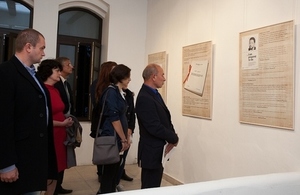The British Embassy takes its Magna Carta exhibition to Varna
The British Ambassador opens a 10-day exhibition in Varna that highlights the principle that no one is above the law.

British Embassy launches its Magna Carta exhibition in Varna
The British Ambassador to Bulgaria Emma Hopkins OBE opened a Magna Carta exhibition in the Varna City Art Gallery on 29 September 2015. The exhibition includes 16 images that explain the history, impact and legacy of Magna Carta, which celebrates its 800th anniversary this year. The exhibition is free and open to the public until 9 October 2015. It is part of a year-long programme run by the Embassy that highlights the legacy of Magna Carta, in particular the principle that no one is above the law. The featured items have been provided by the UK Parliament, the National Archives and the British Library.
Emma Hopkins OBE, British Ambassador to Bulgaria, commented at the opening of the exhibition:
It is my great pleasure to open in Varna our second Magna Carta exhibition after it was displayed in the National Parliament in June this year.
Magna Carta continues to resonate today 800 years after it was sealed because of the importance of the principles which it established. The idea that no one is above the law and everyone is entitled to a fair trial. It shaped our understanding of democracy and responsible governance, and respect for individual rights.
In this year of constitutional change in Bulgaria, Magna Carta is more relevant than ever. What we have learnt in the intervening 800 years is that the fight against arbitrary decisions, and justice for all, is the personal responsibility of each and every one of us.
I hope that this exhibition will likewise prove inspiring to those who see it.
Note to Editors
About Magna Carta
Magna Carta was a peace treaty sealed in 1215 between King John of England and his barons, who were in rebellion against his rule. The Great Charter contained sixty-three clauses, the most well-known of which gave all English people the right to justice and a fair trial. The Magna Carta principles are reflected in the United States Bill of Rights, the Universal Declaration of Human Rights and the European Convention on Human Rights. In the 1964 trial for his life, Nelson Mandela cited Magna Carta as one of the key documents valued by democrats worldwide. And it continues to be cited – these days most often as a symbol of justice, freedom and democracy – in legal processes across the world.
What started out as a document of specific complaints from a group of barons has turned into an international symbol of liberty, without which we might not have the rights we value so much today.